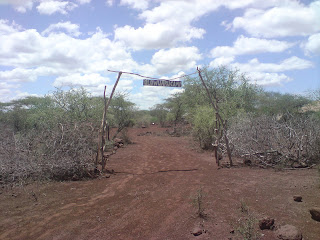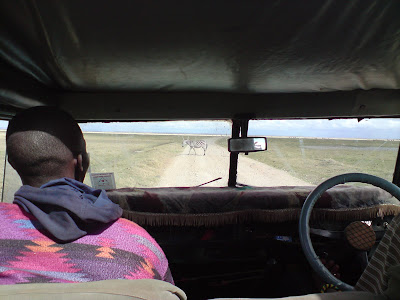Quite a different one for us this year, celebrating on Christmas eve to keep the German kids happy, but it was still nice, although slightly lacking in "festive feel", particularly as it was sunny!
The weekend before christmas Mrs Grasshopper and I returned to Mcleod Ganj, a small village just north of Dharamsala, home to His Holyness the Dala Lama, and the Tibeten goverment in exile. As you journey along the 35km road from camp, and up a few hundred meters, you can see the change in the people, the clothing, the dress and features. Traditional northern India seems to melt into Tibet, with a surprising nepalese influence.

Our nice little hotel room with a balcony overlooking the valley was 300 rupees per night, including a heater. Two 650ml bottles of Kingfisher strong also costs 300 rupees...
This weekend however we were driven to Mcleod by Mohan, one of the project executives here at the Idex camp, as we were trekking up the mountain overlooking Dharamsala. Our first night we went out with our room-mate Bethany, who was to be trekking with us, and Greg, an 18 year old public schoolboy, doggedly pursuing his passions of theology, philosophy and Bethany, (a futile pursuit which is often cringworthy if humorous, maybe due to his boarding-school inflicted inexperiance, and his sense of humor failure).
We went to a place Mrs Grasshopper and I found called Excite, a bizare blend of western style nightclub, resturaunt and bar, but with a unique Indian/Tibeten feel. Lots of neon lights, white table cloths and a tape player blaring a mix-match of Steps, Britany Spears, The Eagles and 50 Cent through large speakers. It is so cheesy its actually kind of cool! Before 8pm there is only ever 3 other people in, but after 8 the music somehow gets louder, and the tables and dancefloor are suddenly packed with young and beautiful Tibetens, drinking, smoking and laughing.
The previous friday Mrs G and I were chugging on our Kingfishers after a meal of Tibeten momo's and chilli sauce, when the oldest swinger in town approached. Long black hair swept back into a poytail, and with the characteristic trendy clothing and genuine smile, he leans over to me and shouts over the blaring music "Hello! Want some coke? Ganja? Ecstacy? any thing else you like- I can get, what you want?"
I notice he's proffering a white bag towards me, a trippy pick-and-mix just visible through the open top.
"Nah mate, I'm fine, cheers" I reply, shaking my head, a bit taken aback.
"No problem!" he gives me a big grin, pats my shoulder and dances away, slack jaw and wide eyes suggesting he enjoys his products. 10 mins later he's back, "Can I just leave this here?"- before I can reply, he dumps his bag of drugs at our table and bounces like Zebiddy through the dancefloor crowd.
Shit- I look at Mrs Grasshopper, and we make ready to leave. Thankfully he's back just as Mrs G and I start getting up, giving a thumbs up and mega-grin to me while grabbing the bag and disappearing towards the toilets.
This friday however was a lot more subdued, and knowing we were starting our trek at 7am the following day, we were early to bed, only having a few drinks with our momos and pakoras.
The next morning we were up, rucksacks packed, guides met, Mohan met, and walking up the steepest hill I've ever known by 7.15am.
I swear, it must have been nearly verticle! After 5 mins I had stripped down to my t-shirt, my lungs were burning, legs wobbling and sweat stinging my eyes. We were still getting over bad colds I though to myself. But I looked at our guide Aziz, and noticed he was lighting a cigarette with bored indifference, breathing just fine. Mohan was similerly unaffected, and he gave me a smile as I dripped beside him. I looked behind me and was somewhat relieved to see Mrs Grasshopper and Bethany were also red-faced and wheezing, bent double due to the gradient and magnified weight of our rucksacks. 10 mins later, I looked back to see Bethany turn around and start making down the hill, and I hung back for Mrs G to catch up.
"It's just the two of us" she pants.
"Umf" I manage by way of reply.
An hour later we were wrapped up again in our fleeces, sipping hot chai (Indian Tea) at a mountainside rest point while our breakfast was cooked. Ive noticed so far that in India, dogs are everywhere, both pets and strays, and the mountainside was no exception. A small teddybear-like puppy was the object of our affections through our breakfast of cheese omlette and Roti.
Filled up, we set off, finding we had recovered from the sharp shock of the start and were 
By the time we reached the final chai-stop, we were often knee-deep in snow. I was glad of it at first, cooling my hot aching feet through the thick leather of my "technical" hiking boots. However, the snow soon started to work it's way down the tops of my boots, soaking my thick socks and freezing my feet. I suddenly understood why the bloke who sold me the boots said "breathability is bollocks, most of the time".
The banter and messing about with the dog soon stopped as we focused on the trail, which had increased in intensity and was virtually invisible under thick snow-drifts. When we weren't slogging knee-deep in ice-topped snow between huge boulders, we were gingerly edging forwards and up, inches from the sheer drop into the valley below. The views, though stunning, made me dizzy, and I started to really worry about Mrs Grashopper, who was complaining of dizzyness, and had developed a nervous jerkyness to her movements as she made her way up.
As we stopped for a breather after a particularly hair-raising section, I asked Mohan how much further to the rest house, where we would be staying that night.
He wobbled his head from side to side in the typical indian fashion. "10 mins"
And it was! 
The views into the valley were amazing- it felt like we were on top of the world itself. In the far distance was a constant smear of light, which Aziz informed us was a masive lake in Punjab, reflecting the afternoon sun.
One thing I have noticed in here in India is how much the men play. Be it volleyball, cricket, badminton, or even cards, there seems a sense of fun which is not as apparent in the english culture. So it was natural, despite being physically shattered, to have a mass snowball fight, playing with Doggy, and laughing till tears came at Mohan and Aziz wrestling and falling over in the snow. We eaten a simple meal of rice and chickpea dal, and settled down in dry socks on the snow-cleared concerete in front of the resthouse. We were all soon snoozing, with the warm sun heating our dark clothes and drying our boots.
There were no toilet or running water facuilities at the top, and I felt my stomach "chunder" as I drifted off to sleep. But I figured I would be fine, there is huge space and only a few of us, so easy enough to go behind a rock to "lighten the load" when neccessary.
I woke up to Doggy licking my face. I pushed him away, groaning at the smell of his breath, and he patiently settled down tight next to me. I looked up, absently stroking Doggy's soft fur, and realised we had company- 45 other trekkers, all settled down around us. No toilet, freezing cold, loads of people and gleaming white snow. Great.
We went for a further walk along the southern ridge, Doggy chasing his shadow in the snow. The view was breathtaking. Mountains, rivers and lakes rolled out below us for 100s of miles, tinted blue under a thin blanket of whispy cloud. As the sun dipped to the western horizon, the world around us turned electric pink.

Shortly after a rapid sunset where the sun appeared to sink into the ground, dinner was provided by the shack furthest from the house. We could see the yellow-red flames of a fire as we approached, and as I ducked into the tiny shack, my eyes stung sharply with the smoke. The inside was a low-ceilinged, dark, smoky grotto filled with bottles of water, chocolate and ciggerettes. A low shelf covered in blankets provided seating for us. I hurriedly sat down in the corner, instantly relieved of the woodsmoke clouding the ceiling, and Mrs G sat tight beside me. The other chaps sat to my left, and tightly packed, with the fire-box close in front, I felt my toes start to thaw. As my eyes grew accustomed to the dark gloom, I noticed there was a tiny cooking area just off to one side, where a tall, by local sizes, man was hunched over a cooking pot. I also noticed a western woman in Indian clothes holding a gangly puppy, sat on the floor next to my wife. Music played from a battered old radio, surprisingly modern western music from a Pakistani station adding a strange twist to the atmosphere.
There we warmed up, played with the puppy and eaten a filling dinner of hot spicy dal and sticky, heavy rice. The girl spoke german to her puppy, who delighted in chewing our fingers, english to us, and hindi to the bloke cooking, who I assumed to be her indian boyfriend, judging by their mannerisms and behaviour. Beedies (an indian ready-made, tobacco-leaf wrapped roll-up ciggerete, which are surprisingly smooth to smoke) were passed round, after which we made our way back to our shared room at the resthouse. Our breath was really fogging, and I noticed the snow had frozen, now offering easy passage where before we had been falling into it knee-deep.
Wearing two jumpers, thermal underwear, micro-fleece, trousers, hat and settled in sleepingbags, Mrs Grasshopper and I snuggled down on a thin floor covering. We soon fell into a hot, fitfull sleep, listening to Mohan and Aziz fart, mumble and snore 'till morning.
The morning we left was bright and surprisingly warm, making the snow slowly recede from the rocks, where we ate a bowl of hot spicy noodles and watched Doggy play with the puppy from the night before.
The descent was just as treacherous in the icy stages as the ascent, but soon the trail eased, allowing a fast yomp that quickly took us back to Mcleod Ganj by early afternoon. We said our goodbyes to Aziz in the main square, and after a beer and a plate of pakoras, I was able to buy a few christmas presents for Mrs Grasshopper. I knew from the shopkeepers expression that I smelt bad, real bad, having sweat so much and not washed, and I looked awful, sun-burnt, muddy and unshaven. But it was worth it, the best time in India so far.





 Each tent had two or three small chairs sat outside on cleanly-swept
Each tent had two or three small chairs sat outside on cleanly-swept 




